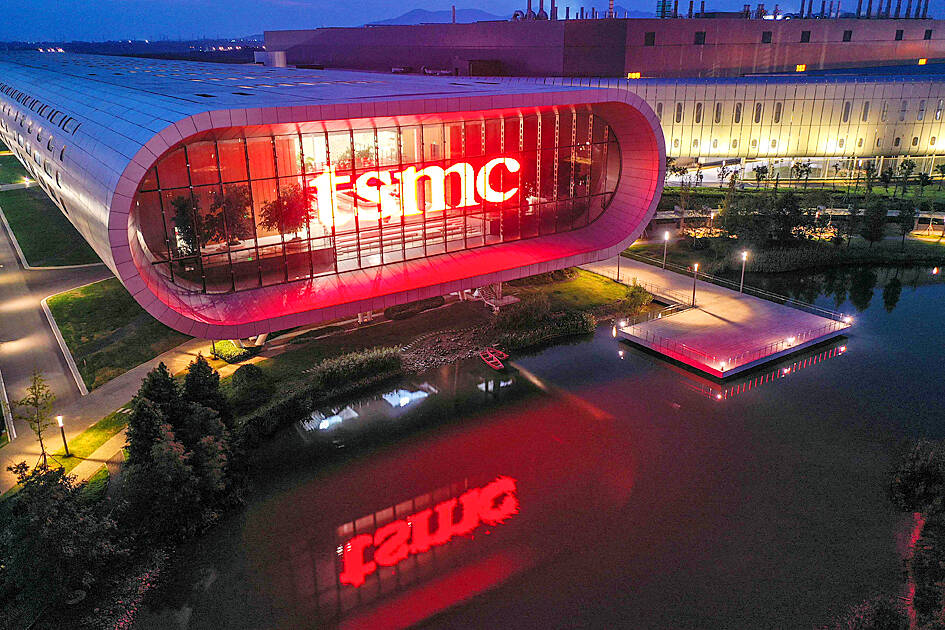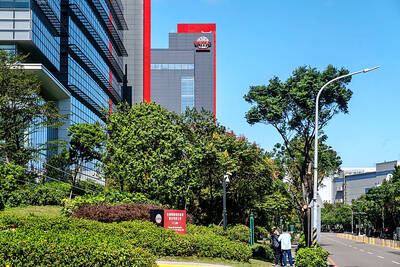Taiwan Semiconductor Manufacturing Co (TSMC, 台積電) yesterday reported annual revenue growth of 16.2 percent to NT$200.05 billion (US$6.64 billion) last month, indicating that the world’s biggest contract chipmaker and a sole chip supplier for iPhones was unfazed by quarters-long supply chain inventory corrections.
Last month’s revenue was the strongest January performance in the chipmaker’s history. On a sequential basis, revenue expanded 3.9 percent, from NT$192.56 billion in December, the company said in a statement.
However, TSMC is not immune to the supply chain correction cycles and could start seeing weaker monthly revenue from this month, as the company forecast that revenue would dip 16 to 12 percent to US$16.7 billion to US$17.5 billion this quarter, compared with US$19.93 billion last quarter.

Photo: AFP
“As customers and supply chains continue to take actions, we forecast semiconductor or inventory will reduce sharply through the first half of 2023,” TSMC CEO C.C. Wei (魏哲家) told investors last month.
The chipmaker expected revenue to decline by a mid-to-high single-digit percentage in the first half of this year with softer-than-expected demand for 7-nanometer chips used mostly in consumer electronics than it forecast in October last year, Wei said.
TSMC expects a milder pickup in demand for 7-nanometer chips in the second half than it expected three months ago, Wei said.
Separately, MediaTek Inc (聯發科) yesterday reported revenue of NT$22.38 billion for last month, down 48.55 percent year-on-year from NT$43.5 billion.
On a monthly basis, revenue dropped 42.14 percent from NT$38.69 billion in December, the world’s biggest supplier of 5G smartphone chips said.
Last month’s revenue was the lowest in 31 months, as excessive inventory depressed smartphone chip demand. Smartphone chips contributed more than half of the company’s revenue last quarter.
MediaTek earlier this month said that most customers were conservative about their business outlook and have been carefully managing their inventory.
MediaTek is a customer of TSMC.
MediaTek expected revenue to hit the bottom this quarter, paving the way for a rebound next quarter.
The company expected order visibility to improve starting next quarter, citing some early signs of mild pickup in demand for TV chips and Wi-Fi chips following an economic reopening in China.
The Hsinchu-based company projected that revenue this quarter would shrink 6 to 14 percent sequentially to NT$93 billion to NT$101.7 billion.
That would make this quarter the worst since the fourth quarter of 2020.
Global index provider MSCI Inc has raised Taiwan’s weighting in one of its major indices, but left the country’s weighting in two others unchanged.MSCI yesterday said in a statement that following a quarterly review, it increased Taiwan’s weighting in the MSCI All-Country Asia ex-Japan Index by 0.03

LOCAL INNOVATION: Hon Hai was not among the top 10 local patent applicants, because the company assigns its research and development in the US and Japan Taiwan Semiconductor Manufacturing Co (TSMC, 台積電), the world’s largest contract chipmaker, took the top spot among patent applicants in the country for the seventh consecutive year last year, the Intellectual Property Office of the Ministry of Economic Affairs said on Friday.TSMC last year filed 1,5

QUICK REVERSAL: The move sent the chipmaker’s share price down 3.67 percent, after the billionaire investor’s company in October disclosed a major TSMC stake Warren Buffett slashed his holding of Taiwan Semiconductor Manufacturing Co (TSMC, 台積電) just months after disclosing a major stake, an unusually quick reversal by the billionaire investor that is chilling investor sentiment toward the chip giant.Buffett’s Berkshire Hathaway Inc cut its holding of TS

TSMC MEETING: The US lawmakers said the visit is not meant to provoke China, but to deepen cooperation in economic and political matters, as cross-party talks are planned The US and Taiwan should increase cooperation in manufacturing and innovation to benefit the world, a visiting US delegation said after meeting with Taiwan Semiconductor Manufacturing Co (TSMC, 台積電) founder Morris Chang (張忠謀) yesterday.US representatives Ro Khanna, Jake Auchincloss, Jonathan Jackson

NEW IDENTITY: Known for its software, India has expanded into hardware, with its semiconductor industry growing from US$38bn in 2023 to US$45bn to US$50bn India on Saturday inaugurated its first semiconductor assembly and test facility, a milestone in the government’s push to reduce dependence on foreign chipmakers and stake a claim in a sector dominated by China. Indian Prime Minister Narendra Modi opened US firm Micron Technology Inc’s semiconductor assembly, test and packaging unit in his home state of Gujarat, hailing the “dawn of a new era” for India’s technology ambitions. “When young Indians look back in the future, they will see this decade as the turning point in our tech future,” Modi told the event, which was broadcast on his YouTube channel. The plant would convert

‘SEISMIC SHIFT’: The researcher forecast there would be about 1.1 billion mobile shipments this year, down from 1.26 billion the prior year and erasing years of gains The global smartphone market is expected to contract 12.9 percent this year due to the unprecedented memorychip shortage, marking “a crisis like no other,” researcher International Data Corp (IDC) said. The new forecast, a dramatic revision down from earlier estimates, gives the latest accounting of the ongoing memory crunch that is affecting every corner of the electronics industry. The demand for advanced memory to power artificial intelligence (AI) tasks has drained global supply until well into next year and jeopardizes the business model of many smartphone makers. IDC forecast about 1.1 billion mobile shipments this year, down from 1.26 billion the prior

People stand in a Pokemon store in Tokyo on Thursday. One of the world highest-grossing franchises is celebrated its 30th anniversary yesterday.

Zimbabwe’s ban on raw lithium exports is forcing Chinese miners to rethink their strategy, speeding up plans to process the metal locally instead of shipping it to China’s vast rechargeable battery industry. The country is Africa’s largest lithium producer and has one of the world’s largest reserves, according to the US Geological Survey (USGS). Zimbabwe already banned the export of lithium ore in 2022 and last year announced it would halt exports of lithium concentrates from January next year. However, on Wednesday it imposed the ban with immediate effect, leaving unclear what the lithium mining sector would do in the